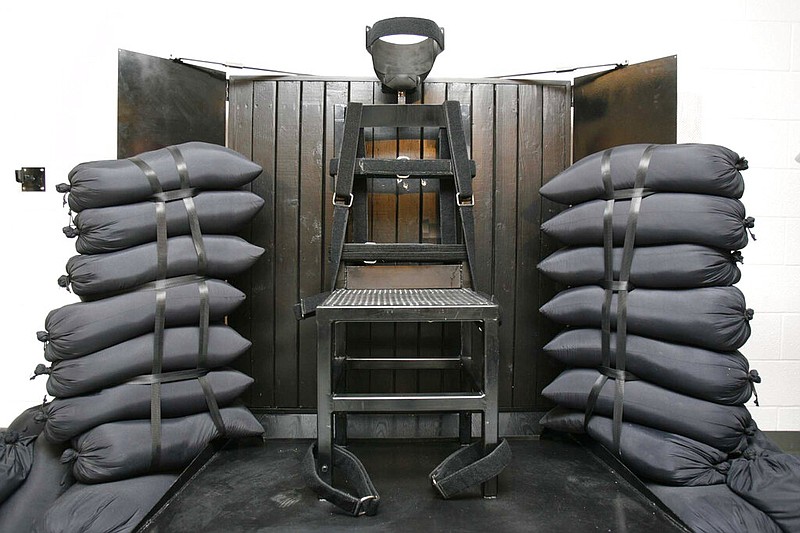NASHVILLE -- Inmates on Tennessee's Death Row would have the choice of being executed by a firing squad as one of their options under legislation moving in the state Senate and House.
Senate Judiciary Committee members approved the new method by way of Senate Bill 1152, on a 5-2 vote. Two senators, including the panel's chairman, Republican Todd Gardenhire of Chattanooga, did not cast an aye or nay vote.
Tennessee currently has lethal injection and electrocution protocols. Gov. Bill Lee called a halt to the state's lethal injection process amid the discovery of problems with the procedure.
The House firing squad bill is already moving through the chamber and is pending in the Finance Committee, where it is expected to receive funding as part of the state's 2023-2024 budget.
Sen. Frank Niceley, R-Strawberry Plains, is carrying the Senate bill. Rep. Dennis Powers, R-Jacksboro, the House sponsor, appeared before the panel, telling senators he thinks condemned prisoners would opt for the firing squad.
"It's the most efficient, effective, humane method of carrying out an execution," Powers said. "It simply gives the Department of Correction and the death row inmates another option. And the Department of Correction is not philosophically opposed to this bill."
He said if the bill clears the legislature, Tennessee would join four other states offering execution by firing squad. Other states are Utah, South Carolina, Mississippi and Idaho.
Sen. London Lamar, D-Memphis, said only Utah has recently executed someone by firing squad, adding it's the only state to have done so since the Civil War and came at what she called a "staggering" cost, with $1.5 million spent on a special chamber to conduct the execution in which five law enforcement officers participated.
"The South Carolina Supreme Court found this not only unconstitutional but cruel and unusual punishment," Lamar told colleagues. "I want to make it very clear that those states, nobody's actually using this for execution except the one time in Utah.
"Moreover," Lamar added, "this is morally wrong. Why would we want correctional officers to sit there and point guns at an individual as a form of killing them? It's almost legalizing first-degree murder. That is not cool, and we do not want to be a state that sits there and allows people to use individuals as if they're dummies in a gun range. One of the most humane things we can do is to continue to use lethal injection, which is the least harmful, least painful form to put somebody to death."
Powers said the legislative fiscal analysts peg a $53,000 cost to the bill. That's based on South Carolina's cost estimate.
Gardenhire had questions.
"I don't know first hand. I've read that when someone tries to commit suicide with a pistol or shotgun, sometimes they flinch knowing they're pulling a trigger and maybe blow half their face off but they still live," Gardenhire said. "And if you -- I'm only going by what I've seen in Western movies. I haven't ever seen an execution or an execution by firing squad, but you see ready, aim, fire. What happens if the guy or lady flinches and you don't kill him. Do you re-load?"
Niceley jumped in.
"Mr. Chairman, he's strapped in the chair, he can't move, his head's secure, he's secure, a target on his heart. And, like I say, drugs affect different people different ways."
Niceley said someone given a lethal injection "may suffer a long time" before dying.
"Electricity affects people different ways," he added. "We've had people in electric chairs that they didn't kill.
"Four bullets to the heart affects everybody the same," Niceley added. "Instant death, painless, it's over. I think it's more humane, actually. Like I say, drugs affect people different, electricity affects people different. Four bullets in the heart are pretty much the same for everybody."
Asked by Lamar whether he thought death by firing squad was cruel, Niceley said he didn't.
"You don't know what that person did to that little girl, or that little boy or that old man. No, it's not cruel," he said of execution by firing squad. "It's not cruel at all."
Senate Judiciary Committee members delayed final action on another Niceley measure, Senate Bill 908, on citizen arrests.
It authorizes a private citizen to threaten to use deadly force in making an arrest for a crime committed or threatened against a person who makes the arrest or a violent crime committed or threatened in the presence of the private citizen making the arrest.
Contact Andy Sher at asher@timesfreepress.com or 615-285-9480.
